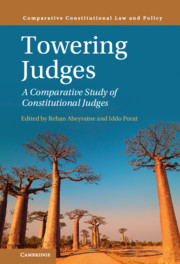Book contents
- Towering Judges
- Comparative Constitutional Law and Policy
- Towering Judges
- Copyright page
- Dedication
- Contents
- Acknowledgements
- Contributors
- Introduction: Towering Judges – A Conceptual and Comparative Analysis
- 1 Towering Judges and Global Constitutionalism
- 2 The Landscapes that Towering Judges Tower Over
- 3 Sir Anthony Mason: Towering Over the High Court of Australia
- 4 Lady Hale: A Feminist Towering Judge
- 5 Hugh Kennedy: Ireland’s (Quietly) Towering Nation-Maker
- 6 Judicial Rhetoric of a Liberal Polity: Hong Kong, 1997–2012
- 7 Judicial Minimalism as Towering: Singapore’s Chief Justice Chan Sek Keong
- 8 Nepal’s Most Towering Judge: The Honourable Kalyan Shrestha
- 9 Barak’s Legal Revolutions and What Remains of Them: Authoritarian Abuse of the Judiciary-Empowerment Revolution in Israel
- 10 PN Bhagwati and the Transformation of India’s Judiciary
- 11 Justice Cepeda’s Institution-Building on the Colombian Constitutional Court: A Fusion of the Political and the Legal
- 12 A Towering but Modest Judicial Figure: The Case of Arthur Chaskalson
- 13 Chief Justice Sólyom and the Paradox of “Revolution under the Rule of Law”
- 14 The Socialist Model of Individual Judicial Powers
- 15 The Civil Law Tradition, the Pinochet Constitution, and Judge Eugenio Valenzuela
- 16 Towering versus Collegial Judges: A Comparative Reflection
- Appendix
- Index
1 - Towering Judges and Global Constitutionalism
Published online by Cambridge University Press: 25 March 2021
- Towering Judges
- Comparative Constitutional Law and Policy
- Towering Judges
- Copyright page
- Dedication
- Contents
- Acknowledgements
- Contributors
- Introduction: Towering Judges – A Conceptual and Comparative Analysis
- 1 Towering Judges and Global Constitutionalism
- 2 The Landscapes that Towering Judges Tower Over
- 3 Sir Anthony Mason: Towering Over the High Court of Australia
- 4 Lady Hale: A Feminist Towering Judge
- 5 Hugh Kennedy: Ireland’s (Quietly) Towering Nation-Maker
- 6 Judicial Rhetoric of a Liberal Polity: Hong Kong, 1997–2012
- 7 Judicial Minimalism as Towering: Singapore’s Chief Justice Chan Sek Keong
- 8 Nepal’s Most Towering Judge: The Honourable Kalyan Shrestha
- 9 Barak’s Legal Revolutions and What Remains of Them: Authoritarian Abuse of the Judiciary-Empowerment Revolution in Israel
- 10 PN Bhagwati and the Transformation of India’s Judiciary
- 11 Justice Cepeda’s Institution-Building on the Colombian Constitutional Court: A Fusion of the Political and the Legal
- 12 A Towering but Modest Judicial Figure: The Case of Arthur Chaskalson
- 13 Chief Justice Sólyom and the Paradox of “Revolution under the Rule of Law”
- 14 The Socialist Model of Individual Judicial Powers
- 15 The Civil Law Tradition, the Pinochet Constitution, and Judge Eugenio Valenzuela
- 16 Towering versus Collegial Judges: A Comparative Reflection
- Appendix
- Index
Summary
This chapter places the towering judges phenomenon in a specific historical and global context, i.e., at the height of global constitutionalism – c. the 1990s – when the liberal cosmopolitanism, human rights culture, and constitutionalization that had started after WWII peaked following the fall of the Soviet empire and an influx of new constitutional democracies. I list three connections between global constitutionalism and towering judges. First, global constitutionalism placed constitutional judges at the center of the moral and ideological revolution it presented, not only giving them immense moral authority, political influence, and prestige but also enhancing judicial personal agency, i.e., toweringness. Second, the conception of rights adopted at this time empowered judges to interpret rights broadly and expansively to reach, as much as possible, a universal ideal, which also promoted agency and creativity, i.e., toweringness. Last, to belong to the global community of judges that was a feature of global constitutionalism, a judge had to excel and stand out, i.e., tower. The chapter ends by exploring some of the normative challenges to the concept of towering judges.
Keywords
- Type
- Chapter
- Information
- Towering JudgesA Comparative Study of Constitutional Judges, pp. 21 - 39Publisher: Cambridge University PressPrint publication year: 2021



